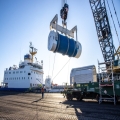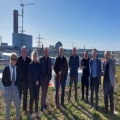Nuclear waste specialists are involved in the safety and day-to-day running of decommissioning nuclear power stations.
The decommissioning process involves a series of specialised operations that involve the removal of highly toxic waste material.
This involves activities from shutdown and removal of nuclear material to the environmental restoration of the site. The whole process is complex and typically takes 20 to 30 years to complete.
Pre-decommissioning
- Development of a decommissioning plan
- Involvement of the public (in democracies)
- Application for a decommissioning license
- Permanent shutdown
- Removal and disposal of nuclear fuel, coolant(s) and/or moderator
Decommissioning
- Dismantling and decontamination
- Restoration of the environment
- Ongoing monitoring of the site
- Monitoring and maintenance of the interim storage of spent fuel
- Final disposal of radioactive waste
The UK has 13 former nuclear power stations and reactors in various stages of decommissioning:
- Berkeley
- Bradwell
- Chapelcross
- Dounreay (including the Vulcan Naval Reactor Test Establishment)
- Dungeness A
- Harwell
- Hinkley Point A
- Hunterston A
- Oldbury
- Sizewell A
- Trawsfynydd
- Winfrith
- Wylfa
Typical Roles
- Business Case Managers
- Biosphere Research Manager
- CEI Engineers
- Geologists
- Civil Engineering Managers
- Commercial Analysts
- Community Engagement Officers
- Contract Framework Administrator
- Cost Managers
- Criticality Safety Specialist
- Data / Commercial Analysts
- Digital and IT Project Managers
- EC&I Installation, Commissioning and Pre-Operations Engineers
- EHSSQ Performance Monitoring and Improvement Lead
- Engineering Technicians
- Enterprise Risk Managers
- Environmental Advisors
- Finance Managers
- Governance and Assurance CoOrdinators
- Grants Managers
- Group Waste Model Managers
- Health and Safety Manager (Standards & Assurance)
- Information Document Controllers
- Waste Specialists
- Mechanical Engineers
- Quality Engineers
- Maintenance Electricians
- Maintenance Mechanical Fitters
- Operational Technology Engineers
- Plant Engineering Technicians
- Programme Managers
- Project Managers
- Project Controls Engineers
- Project Responsible Engineers
- Radiation Protection Advisers
- Records Advisors
- Research Managers
- Safety Case Engineers
- Security and Safeguard Lead
What it takes to become a waste specialist
As a nuclear waste specialist you will need to demonstrate a clear understanding of:
- The practice involved with the minimisation, packaging and removal of hazardous materials and transfer of materials to designated storage area.
- A variety of continuous improvement.
- The safety (nuclear, radiological, conventional and environmental), security and behavioural expectations of those working on nuclear.
- The fundamental principles and implications of radiation.
- The procedures for dealing with radioactive discharges, waste and environmental controls.
- The reasons for and application of a variety of safety management systems such as Permit to Work, Standard Operating Procedures and Risk.
- The implications and relevance of company policy, external legislation and regulation on working practices (including environmental control).
- How Human Performance and Human Factors affect nuclear safety culture.
- How to respond correctly to Emergency Arrangements.
- How plant equipment and systems such as ventilation, steam and cooling water operate and support a safe working environment.
You will need to pass a security check with the minimum requirement being a BPSS security clearance and have a driving licence to get to work outside of public transport hours.
Early Careers
If you are in the early stages of your career and nuclear is your first choice, here are some of the different ways of starting a career as a nuclear waste specialist.
Obtaining a university degree in:
- nuclear engineering
- chemical engineering
- mechanical engineering
- a graduate training scheme in nuclear technology materials and nuclear engineering
Other routes include a 2-year graduate training scheme called Nuclear Graduates, which is run by nuclear industry employers. On the scheme, you'll receive professional development training in different areas of the nuclear industry. You'll normally need a degree in a science or engineering subject to apply for a place.
To become a nuclear engineer, you will need the following qualifications:
- 2 or 3 A levels, or equivalent, including maths and physics a degree in a relevant subject for postgraduate study.
- 4 or 5 GCSEs at grades 9 to 4 (A* to C) and A levels, or equivalent, for a degree apprenticeship.
You may be able to apply for a place on an apprenticeship, such as: Nuclear Scientist and Nuclear Engineer Level 6 Degree Apprenticeship Nuclear Reactor Desk Engineer Level 6 Degree Apprenticeship.
These take around 3 years to complete.
Salary and working the week.
Average salary (a year)
- Starter - £24,000
- Experienced - £43,000
- Head of Department - £70,000
- The working week - 39 to 41 a week
- You could work evenings / weekends / bank holidays on shifts
- 101 views







